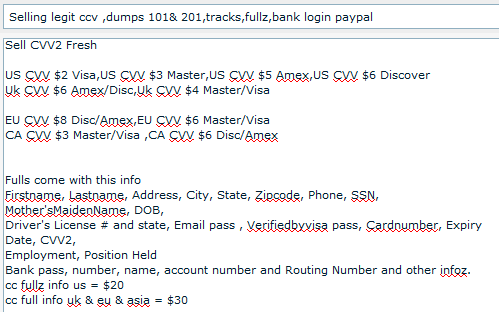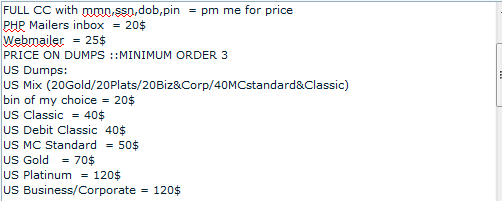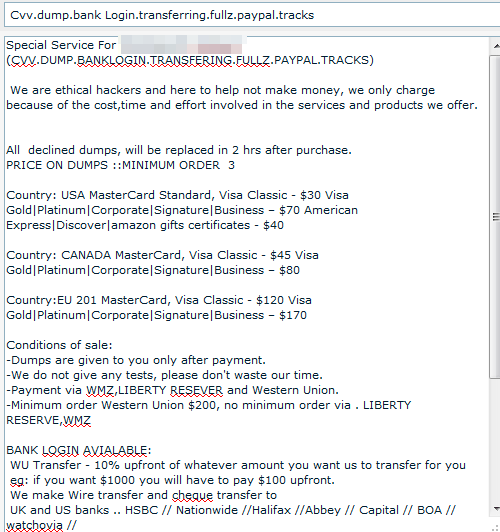This informative guest post is written by Michael Dolen, owner of the popular Credit Card Forum. Michael provides a glimpse of how stolen-data brokers operate and shares a few examples of actual data-for-sale posts he routinely blocks from seeing the light of day--at least on his site.
How Your Credit Card Numbers Are Bought & Sold Online
When someone falls victim to credit card fraud, it's not unusual for the charges to be occurring on the other side of the country, or even the other side of the world. So how is it that these scammers so far away are getting ahold of your account information?
The answer may lie within the underground world of carding. What is that you ask? Well, here is how Wikipedia defines it:
"Carding is a term used for a process to verify the validity of stolen card data. The thief presents the card information on a website that has real-time transaction processing."
As you can probably guess, this takes place on forums and chat rooms, which are often times hosted in more lax countries in order to evade law enforcement. It has been estimated that around 50% of these forums are English only, since many cater to Russian and Eastern European countries.
The case of mistaken identity
In 2008, I decided to launch a message board where people could talk about credit card offers and Credit Card Forum was the result. A boring name? Yep I know it is, but those really are the actual words in my domain, creditcardforum.com, and because of that, it ranks very highly in the search engines for that phrase and similar combinations.
For example if you search for "credit card forum" you will see my site at the top. Furthermore, because one of the forums on my site is dedicated to helping credit card fraud victims, you will also see it ranks at the top (or at least it did last I checked) for the phrase "credit card fraud forum." (Yes... you can probably guess where I'm going with this story!)
Anyone that's even semi-proficient in English who stumbles upon my site will clearly see it's a blog and message board where consumers voice their feedback about credit card offers and related topics. However to someone who doesn't know English, they might mistake it for being something else...some have mistaken my site as being one of those other forums.
What doesn't see the light of day
The primary reason I moderate posts is because I get so much spam from people trying to peddle their financial businesses (like payday lenders, mortgage websites, and so forth). However it's a good thing I do moderate, because once in a while I will also receive a disturbing post from an overseas fraudster who is trying to sell personal finance information.
Here's an example:

That is a screenshot taken from the moderator screen. When a post like that happens, it is quickly deleted and never shows up. As you can see, not only are credit card numbers being sold, but also addresses, Social Security numbers, mother's maiden names, and the whole nine yards.
And how much is your credit card information worth? Well that all depends on the type of card you have....Example:

Corporate and business credit cards tend to fetch the highest prices. In fact, a few months back one of these fraudsters tried to post a comment on my review of the AmEx Business Gold, specifically saying they had "dozens" of Business Gold card accounts for sale at $125 a pop.
Needless to say, the post got deleted and the information was forwarded on to the American Express fraud department as well as on the FBI tips submission form.
For my last example, read the introduction:

Yes that's right, it's the "ethical" stealing of credit cards and bank accounts.
If that's not a contradiction, then I don't know what is!
And now you know
Hopefully my little exposé has provided you some insight into this shady underworld and how easily and quickly people across the globe can acquire your identity and use it for sinister purposes. If this information disturbs you, then I encourage you to write to the politicians and law enforcement, encouraging them to ratchet up their efforts in cracking down. Unfortunately from my experiences and interactions with them, the authorities show little interest in getting serious about putting the kibosh on this industry.
This guest post comes from Michael Dolen of Credit Card Forum. You can follow him on Twitter @CreditCardForum.


 NEWSLETTER SIGN UP
NEWSLETTER SIGN UP SUBSCRIBE
SUBSCRIBE CONTACT
CONTACT

















Leave a comment